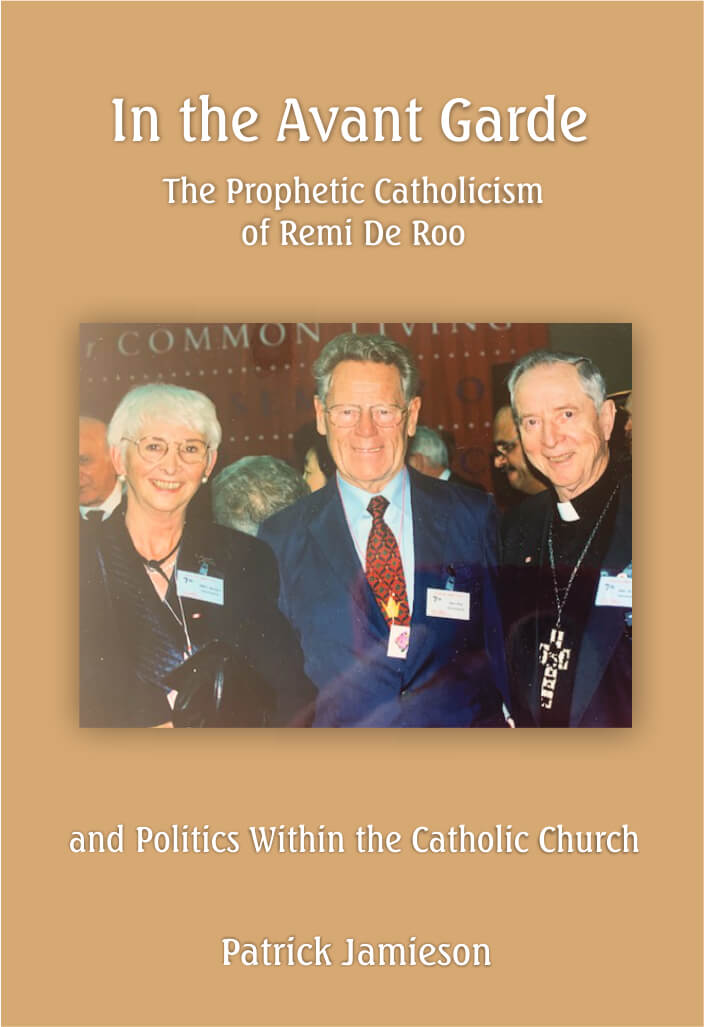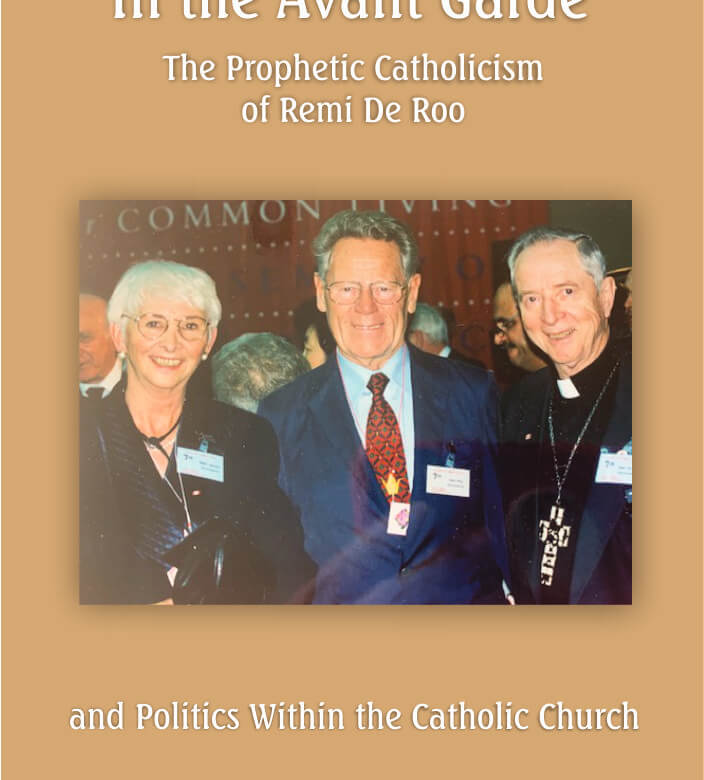Avant Garde Bishop Figures in Ongoing Catholic Cultural Wars
Patrick Jamieson, Victoria
Volume 37 Issue 1, 2 & 3 | Posted: April 1, 2022

VICTORIA – Canada’s most theologically avant garde, socially progressive, and politically controversial bishop Remi Joseph De Roo died here February 1, at age 97. Born February 24, 1924 on the family farm at Swan Lake Manitoba, the second of eight children, he entered the Catholic seminary at age 15 in 1939 and was ordained in 1950. Groomed for higher office, he immediately studied in Rome for his doctorate in theology.
During the 1950s he anticipated the coming changes in the Catholic Church, holding many offices and conducting progressive projects as a priest for twelve years. Eventually he served as pastor for the large Holy Cross English-speaking parish in Norwood, St. Boniface Archdiocese in Winnipeg.
He was shocked at age 38 to be appointed Bishop of sleepy Victoria by the forward-looking Pope John XXIII in 1962. As such he attended and actively participated in all four sessions of the Second Vatican Council (1962-65) in Rome. As a young bishop in a minor diocese, he was able to carry the torch for church and social reform in a wholehearted and majorly effective manner for four decades between 1962 and 1999.
In childhood he directly experienced the value of cooperatives, credit unions and the Canadian prairie wheat pool for the plight of small prairie farmers. As a result he was socially progressive, leaning well to the left as a leader in Canadian society during his tenure. This took the form of international involvements as well as domestic issues.
He was a founding member of The World Religious Conference on Peace and visited war-torn central America on a fact-finding visit in the late 1970s. Bishop De Roo met with Archbishop Oscar Romero in El Salvador just before his death in 1980, on a tour coordinated by Canadian Jesuit Father and future Cardinal Michael Czerny. Czerny spoke as an admirer at his funeral February 12 (see lead story by Cardinal Michael Czerny). The Central America visit resulted in one of a number of books published by De Roo, including his memoirs as a Vatican II Father; some of which proved controversial due to their progressive nature.
De Roo served as the chairperson of the Social Affairs Commission of the Canadian Conference of Catholic Bishops during its most pointedly critical period of Canadian Capitalism, from 1975 to 1985. He made headlines in the early 1980s with a critique of federal wage and price control measures, inadvertently taking on Jesuit-educated Prime Minister Pierre Elliott Trudeau, business heads like Conrad Black and Catholic Archbishop Emmett Cardinal Carter of Toronto.
Earlier, in the late 1960s, he chaired the Canadian Bishops Theological Commission when the pope of the day banned artificial contraception in 1968. His leadership response to Humanae Vitae fundamentally placed the burden of conscience back on the individual Catholic couple, while recommending they reflect on the papal teaching and give it the due weight of conscience. This was a significant shift in Catholic sexual teaching. Collegial in style, he worked closely with forward-looking theologians at the time, avoiding the split in the United States between the hierarchy and Catholic theologians.
His extensive consultation with socially progressive, theologically literate, professional Catholic couples in the 1950s anticipated the equation of marriage partnership with the choice of procreative decisions affecting family and parenthood. He made a number of decisive written and spoken interventions at the Vatican II sessions, effecting key documents that came out of the global consultation.
This Catholic controversy lead to a wide division in the Catholic Church in the Western world where over 80 per cent of Catholics disagreed publicly with the official teachings on birth control. A permanent division within the church resulted in the current ongoing crisis of contemporary Catholicism. Church politics have swung left and right since that time with the current Jesuit pope on the progressive side. In my biography of Bishop De Roo (2002), I attempt to connect the dots leading to this conclusion, seeing him as an albeit unconscious factor in the culture wars that currently plague the church.
In Victoria, De Roo lead a ten year rigorous synodal process in his diocese anticipating the current pope’s calling of a similar global consultation with the laity. De Roo was a leading exponent of in-depth lay consultation even before the Second Vatican Council which brought about its extensive reforms in this direction.
RETIREMENT CONTROVERSY
One of the longest serving bishops in Canadian history at 37.5 years, De Roo retired in 1999 at the compulsory age of 75. Shortly after, controversy broke out under his successor about a land investment in Washington State that had not been allowed to properly mature, made in the 1990s by De Roo.
Little real clarity about the whole picture resulted, partly because De Roo refused to correct or contradict his successor Raymond Roussin in public. Roussin had been Bishop of Gravelbourg, Saskatchewan where he worked to have Gravelboug diocese suppressed and attached to the Archdiocese of Regina due to financial constraint.
In 2003, De Roo’s former business partner took the Diocese of Victoria to court on the basis of breach of fiduciary responsibility to a business partner. In May, 2005, he won on the basis of the facts of the case. The Diocese of Victoria was under a judgement of 12 million dollars to its business partner, Joseph C. Finley, as a result of the jury verdict. Much confusion resulted because the local Victoria media did not do its proper diligence in researching the case, accepting carte blanche the Diocese of Victoria version of the facts.
Court records revealed that De Roo’s investments had been sound, the national newspaper The Globe and Mail reporting was more thoroughgoing in its journalism, pointing out how the court records were contradicting the Diocese statements and tactics. In its May 31, 2005 headline The Globe and Mail announced that De Roo was vindicated but due to the extent of local media reporting the issue remains clouded in the public’s mind.
The significant fact is that the bishop survived this crisis in contrast to his successor who in his sensitivity suffered personally and ultimately died prematurely as a consequence. After retirement, for the next twenty years, De Roo continued to preach, teach and lead retreats on the subject of the meaning of the reforms of the Second Vatican Council, dying of old age at nearly 98 years.
Sixty years in Victoria, between 1962 and 2022, he spent the entirety of his pastoral life effectively implementing these monumental changes that are said to have brought the Catholic Church positively into the 21st Century. Happily the newspaper headlines reporting on his death, life and contribution reflected this spiritual triumph.
I like his capacity for simple symbolic actions, such as taking the early spring flowers from Victoria to gatherings in still winter bound eastern Canada. His first act upon arriving in Victoria was to take gifts to the leaders of the other major Christian denominations in the region, an unexpected and unprecedented act that set the tone for the next four decades of ecumenical relations in the region.
A brave leader, De Roo was expected to be appointed elsewhere as his star rose but some of his stands on church reform and social affairs cost him these appointments to larger diocese in Canada. As a consequence he used the platform of the smaller diocese to take on global responsibilities and national roles as mentioned in the Canadian Catholic Church.
As a Canadian justice activist, De Roo served as the first chairperson of the BC Human Rights commission in the 1970s appointed by Premier Dave Barrett. He worked closely with Justice Tom Berger on the Northern Pipeline Commission consultation and was a colleague of Maude Barlow of the Council of Canadians and an ally and compatriot of environmental icon David Suzuki.
Work is underway to commission a full biographical history of the bishop. Anyone wishing to support such an academic study, please let us know at ICN. Like a folk hero, Remi Joseph De Roo lives on in our hearts and minds and as an inspiration for our faith lives. Remi De Roo Presente!
Patrick Jamieson, Victoria

